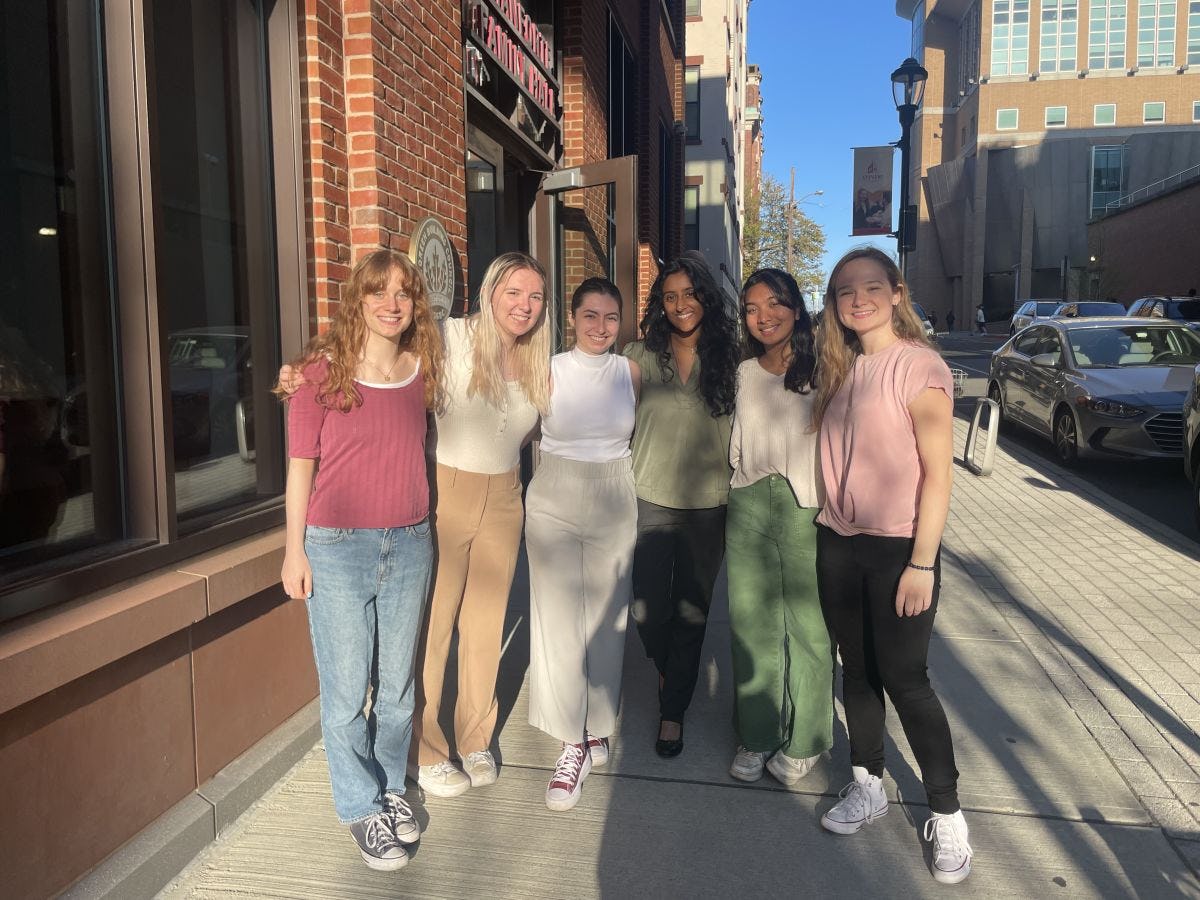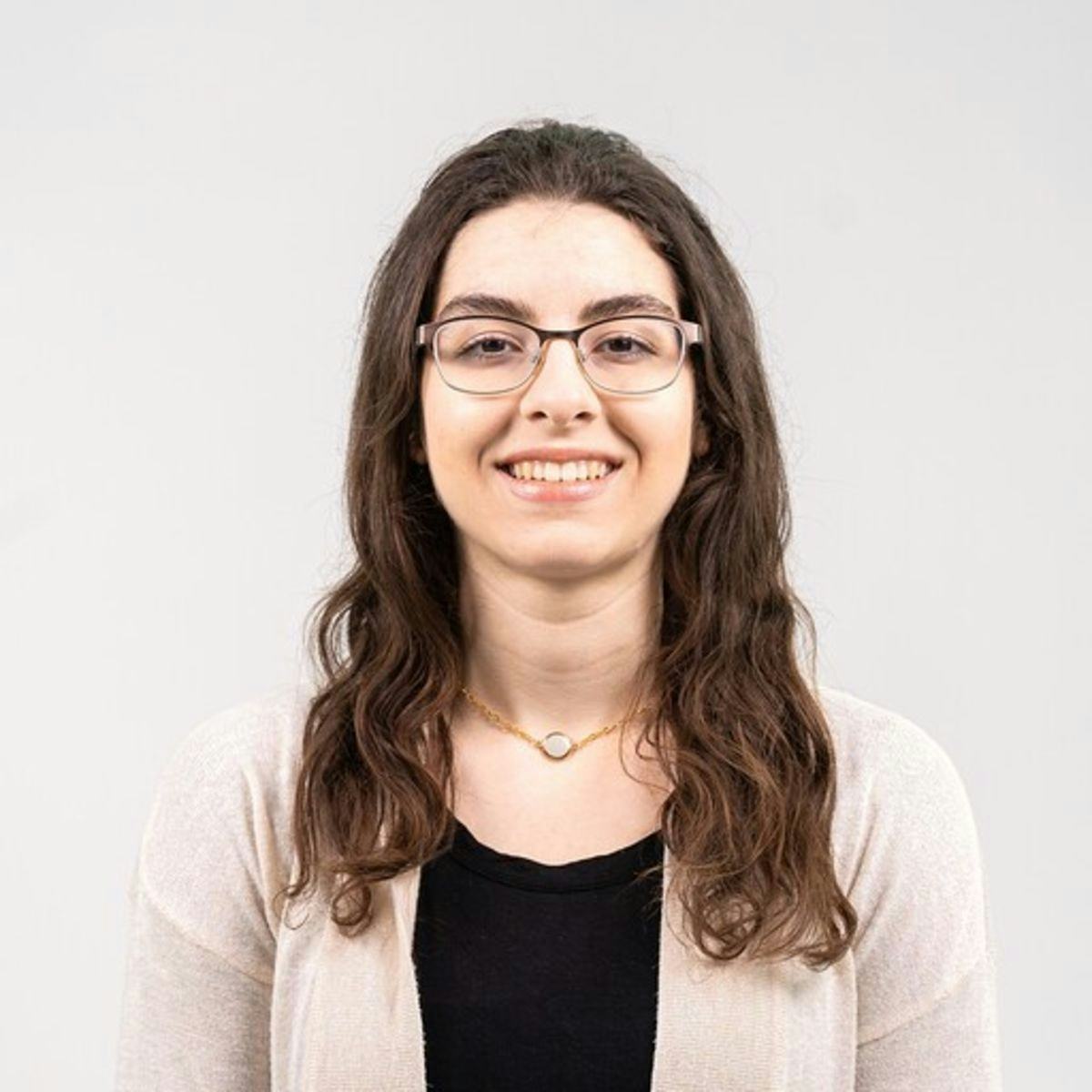Stevens Seniors Envision a Better Future with AI at Innovation Expo 2024
Students showcase their artificial intelligence R&D in fields as diverse as medicine, personal wellness, and coding at the much-anticipated annual event
Stevens Institute of Technology is exploring the leading frontiers of artificial intelligence (AI)-powered technologies and applications to help make our lives safer, healthier, more sustainable and more enjoyable. At Stevens’ annual Innovation Expo, a day when seniors showcase their ingenuitive capstone projects, numerous teams will present their efforts toward developing “beneficial AI” for societal good.
Students across all schools and academic programs study curricula that integrate AI, in fields as diverse as healthcare and medicine, safety and security, bias and equity, energy and sustainability, and others. With more than 100 faculty working toward solving pressing global problems at the Stevens Institute for Artificial Intelligence; and key partners in AI that include NASA, National Oceanic and Atmospheric Administration (NOAA), National Institutes of Health (NIH), National Science Foundation (NSF) and many others — Stevens stands at the forefront of AI research and development.
Here is a snapshot of what Innovation Expo 2024, being held on Friday, April 26, holds.
Project: Machine Learning for Molecular Design (MLMD)
The conventional drug design and development process is extremely expensive and time-consuming, requiring about $1-2 billion dollars and 15-20 years to complete. This massive time and financial commitment results in increased prices on life-saving medications, and a great many people — one in four Americans — cannot afford them. Additionally, the painfully slow process means that, for those who could benefit from a medication still in development, help could arrive too late.
Drug discovery involves much testing and experimentation — mostly to discern unrecorded thermodynamic properties. For their senior design project, a team of chemical engineering students found a way to drastically reduce drug development costs and time, which could ultimately make medications more affordable, accessible, and available sooner. How? By leveraging the capabilities of machine learning, the students estimated that they could cut down the research and development time by 60%, and the cost by 70% — all by replacing traditional laboratory experiments with a powerful prediction model.
The team — comprised of Lucas Acocella ’24, Dariya Baizhigitova ’24 and Jeena Park ’24 — called their model “Machine Learning for Molecular Design” (MLMD). It can accurately predict important properties for drug discovery by referencing the thermodynamic properties of small, organic molecules.
Unlike other software widely used for drug design, the team’s product is capable of predicting the thermodynamic traits of new molecules. Their method also has wide applications across other fields, including green energy, agriculture, the automotive industry and more.
When asked what they valued in their undergraduate education, all three students cited the relationships they formed, and the quality of their instruction.
Baizhigitova, who will pursue a chemistry Ph.D in Professor Yong Zhang’s laboratory at Stevens in the fall, said, “What I value most in a Stevens education is the ability to engage in rigorous undergraduate research and project-focused classes. As an engineering major, I had the opportunity to explore different engineering directions through our engineering design section…But most importantly, the people are what make Stevens so special! I have met some of the best mentors, teachers and friends during my four years here, and for that, I am most grateful!”
Park plans to pursue a master’s degree in public health. She said, “I value the experience of getting exposed to many perspectives of the world and understanding them, given that students and professors from various backgrounds come together in college.”
Acocella, who plans to launch his career in a technical role in either defense or the pharmaceutical industry, added, “I value the openness of professors and the helpful nature of faculty and graduate students.”
Team MLMD’s advisor, Pin-Kuang Lai, assistant professor in the Department of Chemical Engineering and Materials Science, commended the team’s work. “They learned how to process a large data set, write thermodynamics models in Python, extract molecular properties and build machine learning models,” he said.
“This project aligns with Stevens’ educational goal to prepare students for solving complex problems and developing innovative solutions to the most challenging health and biotechnology problems.”
Project: Chat Virtual Personal Trainer (ChatVPT)
For those who just don’t have the budget or the time for a personal trainer, a team of Stevens computer science students have created Chat Virtual Personal Trainer (ChatVPT) — a program that uses artificial intelligence to create personalized workouts based on user input. ChatVPT features a chatbot that gathers information from the customer both pre- and post-workout in order to customize activities, provide motivation and display exercise video tutorials.
After the user indicates that they have completed the workout, the chatbot asks for feedback, which is then used to enhance the AI's response and improve future workout sessions. Overall, the ChatVPT chatbot offers the experience of a personal trainer in a virtual format and allows people to access personalized workouts anytime, anywhere.
Computer science majors Annabelle Crescenzo ’24, Aditi Deshmukh ’24, Paige DiGirolamo ’24, Ayushi Gupta ’24, Skye Jorgensen ’24 and Kailey Totland ’24 led these efforts.
Crescenzo, a Pinnacle Scholar, said that she “[values] the opportunity to explore unique activities outside of the classroom and to discover new interests.” Upon graduation, she plans to continue her education at Stevens and achieve a master’s degree in data science.
On behalf of her team, she stated, “We learned the importance of adaptability and problem-solving. As we faced challenges like incompatible GUI (graphical user interface) software and deprecated API (application programming interface) keys, we learned to persevere and find alternative solutions.”
Advising the team was David Klappholz, associate professor of computer science. He said, "Computer science seniors work on impressive projects for university researchers, early-stage startups, established businesses, and so forth. The work that they do on their projects is very impressive, as they're able, when necessary, to solve problems on topics about which they haven't taken courses, by learning about the relevant topics on their own."
The project was sponsored by VPT.fit, who is already implementing the seniors’ program and promoting ChatGPT as “your own personal AI trainer.”
Project: Data Leakage
Bad coding practices don't only happen in software development settings; code written to train and evaluate machine learning models may contain bugs, too, just like software code can. Data leakage occurs when a machine learning model is unintentionally trained on data that is not present in the training dataset, which can lead to an overly optimistic estimate of model performance and an inability to make generalized predictions. All this may lead to the deployment of a low-quality model.
A team of Stevens computer science majors — Karina Berberian ’24, Catherine DeMario ’24, Brandon Kreiser ’24, Suneedhi Laddha ’24, Roger Shagawat ’24 and Cindy Tran ’24 — banded together to develop a plugin tool that can detect common forms of data leakage in machine learning code. Their tool offers actionable insights and suggestions to help developers rectify data leakage issues, thereby improving the reliability of their machine learning models
DeMario — who has served as president of Stevens Women in Computer Science, and as principal violist of the Stevens Orchestra — relayed that this capstone project has taught her important lessons in communication.
“Working on this project has reinforced to me the need to write clean code and comprehensive documentation,” she said. “It has taught me to regularly share what I learn during periods of independent work with the team, either by writing technical documentation or sharing it in an informal communication channel. You can never over-document or over-communicate.”
She will pursue her master’s degree in computer science at Stevens beginning in the fall.
Klappholz and Eman Abdullah Alomar, assistant professor, School of Systems and Enterprises, advised the seniors for their project.
“Working on a data leakage detection tool presents an excellent opportunity for students to not only enhance their technical skills, but also to develop critical problem-solving abilities and gain valuable hands-on experience in real-world software development challenges,” said Alomar.
“The learning opportunity aligns closely with the educational philosophy at Stevens Institute of Technology, which emphasizes a hands-on, interdisciplinary approach to education,” he continued. “Stevens' curriculum emphasizes practical, project-based learning experiences that prepare students to thrive in dynamic, technology-driven industries.”


